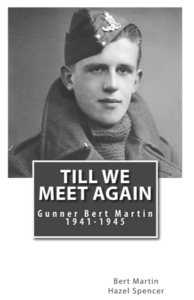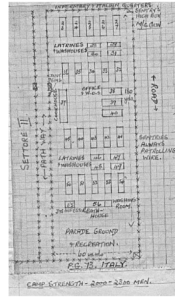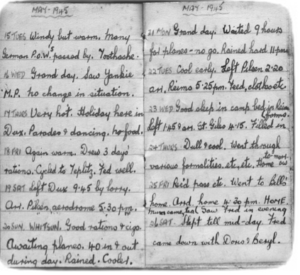Bert Martin
(1919- 1998), 67th Medium Regiment, Royal Artillery

Bert on the cover of his notebook, published by his daughter.
Bert was enlisted on 20 September 1939, when he was only 20. Four months before, he had married his girlfriend, May.
On 17 August 1941, he reached South Africa on the New Zealand ship Rangitiki and, on 21 June 1942, was captured during the battle of Tobruk in Libya. Later, he would recall those long months in the desert, marked by harshness and many difficulties:
I had not even thought of myself becoming a prisoner of war and when I realised this, it was quite a surprise to find. I was in reality a PoW. I lost several photos and my diary, but managed to retain my overcoat, my blanket and my haversack. Now I was a PoW, I thought all my worries were over and everything would be ok, but I was greatly disillusioned during the following months.
During the following days, he was transferred to Derna in an overcrowded camp where conditions were terrible. The heat was relentless. Struck by dysentery and dehydration, Bert was hospitalised for one week. On 6 July 1942, he was transferred to Benghazi where, after an initial moment of dismay (he found himself alone, as his companies had been transferred while he was in the hospital), he met some PoWs he had met during training.
Bert remained in Benghazi for four months and left the camp only on 1 November 1942, as the Italians brought him to Tripoli and, from there, on a ship carrying 500 PoWs, to Naples. Once in Italy, the PoWs were loaded onto a train.
At about 12 noon, we halted at a small station and alighted […]. We formed up in threes and began walking. That procession was pitiful. The chaps were staggering along, some had to be assisted. Everybody’s clothing was just about hanging together as one might have taken us for a bunch of tramps. We must have covered over two miles, passing through the village streets before we reached the camp. We found this only half constructed, but there was enough accommodation for all. This was PG. 68 at Vetralla.
Although the camp was still being built, Bert described the living conditions as much better than in Libya. Red Cross parcels were of great comfort to him, as was the fact that he was now sleeping in a bed inside. Moreover, Bert recalled that the guards treated him well. As a way to fight boredom, Bert decided to register the mail leaving the camp three or four times a week. At Christmas, a representative of the Pope visited the PoWs.
During the last days of December, the PoWs were told they would be dispersed among other camps, as PG 68 would be closed at the beginning of January. Bert was among those transferred to PG 73, Fossoli.
First days at 73 were miserable ones: Jack and I both developed coughs and colds. There was nothing to get up for: outside was cold and the mud was terrible. We used to go out to the latrine, slipping our boots on and not troubling to lace them up. About halfway the one would get stuck in the mud and be forced to lace up one’s boots in order to extract a boot which had become firmly embedded in the mud. Our biggest worry at that time was lice. Every night would see us sitting up in bed looking through out vest and shirts and trying to find every one.

A drawing of the huts in PG. 73 (Source: B. Martin, Till we will meet again)
In the booklet he uses as a diary, Bert noted how, in January, they stopped receiving Red Criss parcels and that their food situation had considerably worsened: «Those were hungry days, and it was terrible counting the hours as they went until the next meal». In February, thanks to better weather (it was less rainy), the PoWs were able to entertain themselves with music and sport. Moreover, Bert started taking French classes. He and his companions passed the time playing darts and walking in the surrounding countryside, watched by the camp’s guards. In May 1943, he finally received two letters from his wife. They were the first he had received since the beginning of the war, although he had written to her multiple times.
Conditions remained unaltered at 73 until that great day came along – Wednesday 8 September 1943. During the morning, our hut went out for a walk. Little did we know at that time that it was our last walk there. When the evening came, we heard that an armistice had been signed between the Allies and Italy. […] I could not bring myself to believe I was free […] We received no arms and were advised by the Italians to remain in the camp. We could do very little about that as the guards were still on duty.
Everyone’s spirits were sky high. The thoughts of home welled up before us, and we were almost in tears […]. The next morning, the blow fell.

The diary pages telleing Bert’s return to his home(Source: B. Martin, Till we will meet again)
The Germans occupied the camp immediately, on 9 September, without any resistance from the Italian guards. Once more, Bert found himself in the condition of a PoW. On 22 September, the Germans ordered the transfer of all PoWs to Germany. Two days later, Bert and his companions were behind the doors of Stalag IV B, Mühlberg.
During the following months, as the Germans were losing ground, the PoWs were moved from one camp to the next. Only near the end of the war, after leaving Dresden (he noted in his diary the horrors of the Allied bombing of the city), Bert managed to slip away in the general chaos and reach the Allied lines.
Up 5.45 pm I am preparing for home going. Received pass and left camp in lorry at 9.15 am. Left Beaconsfield station on special train and arrived at Marylebone at about 10.35 am. Home at 4.30 pm. Home.
Camps related to this story
Sources
B. Martin, H. Spencer, Till will meet again. Gunner Bert Martin, Create Space Independent Publishing Platform, 2017
Imperial War Musem, Oral interview Bertram Martin (1981) doc. n. 5193- https://www.iwm.org.uk/collections/item/object/80005150
